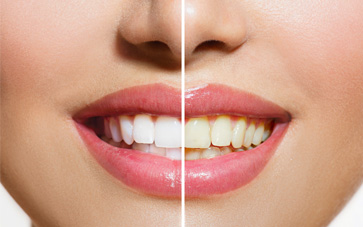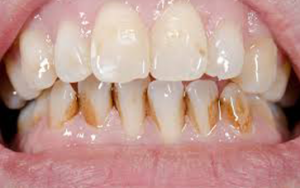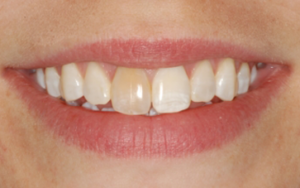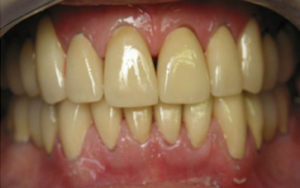

All You Wanted To Know About Teeth Staining
Types of Tooth Discolorations (Stains)
Dental professionals have identified three main categories of tooth discolorations:
- Extrinsic Teeth Stains:
An extrinsic tooth stain is staining on the surface of the tooth which occurs when stain particles, such as pigmented residue from food or drink, build-up and cover the tooth enamel.
Extrinsic tooth stains are caused by:
- Food & Drink: Coffee, tea, dark sodas, red wine, and even a few fruits and vegetables are proven causes of discolored teeth.
- Tobacco: Both cigarettes and chewing tobacco can contribute to discolored teeth.
- Oral Care: Poor dental hygiene, such as inadequate brushing or flossing, can lead to tooth discoloration.
- Intrinsic Teeth Stains:
An intrinsic tooth stain is staining below the surface of the tooth which occurs when stain-causing particles work through the exterior of the tooth and accumulate within the tooth enamel. It occurs when stain-causing particles work through the exterior of the tooth and accumulate within the tooth enamel.
Intrinsic stains are caused by:
- Certain medications
- Trauma or injury to a tooth
- Tooth decay
- Excessive fluoride
- Genetics
- Age-Related Teeth Stains:
Age-related teeth stains combine the results of both intrinsic and extrinsic tooth discoloration. Because the core tissue of your teeth, the dentin naturally yellows over time and so the teeth discolor with age. As we age the enamel that covers the tooth becomes thinner allowing the dentin to show through. These intrinsic causes of discoloration combined with extrinsic causes such as the effects of certain foods, beverages, and tobacco, will cause most adults’ teeth to discolor with age.
Here are answers to some common questions about teeth staining that will help you prevent and address dental stains.
1) Are teeth naturally white in color?
Teeth are not naturally white; they are a pearly shade and as we age, no matter how good your oral hygiene, gradually teeth turn more yellow. You must have noticed, a baby’s snow-white teeth are replaced by permanent teeth that are by nature more yellow in color. As we get older the outer layer of enamel on the teeth wears down and exposes the dentin layer of the teeth which is more yellow. Over time the tartar and wear-and-tear stains appear and can darken the color of teeth.
2) What food and drinks cause teeth staining?
Foods such as
- Highly colored fruits and vegetables like blackcurrants beetroot,
- bright curries contain stain-causing compounds that will build upon your teeth over time.
- likewise, drinks such as
- sugar based sodas
- tea
- coffee
- red wine contain tannins which can turn the teeth brown in color if drunk regularly.
3) Does green tea stain your teeth?
Yes, all types of teas erode teeth enamel and can cause teeth staining. Although tea has many great health benefits, it can also cause stained teeth. There are many different varieties of tea and each has its own capacity to stain teeth. Darker the tea colors, more the chance of it leading to stains.
4) Are teeth stains reversible?
The three primary types of teeth stains are age-related stains, surface stains, and under the surface stains. All these teeth stains can be benefited from teeth whitening treatments. Teeth Whitening in south Delhi is very popular now.
5) How can I prevent teeth staining?
To prevent teeth staining, you must
- Avoid foods and beverages that stain your teeth
- Stop smoking
- Practice good oral care which includes brushing twice a day, flossing daily, and rinsing your mouth after every meal.
- Visit a dentist at least twice a year if you want to prevent your teeth from staining.
6) Do whitening toothpastes work?
Commercial whitening toothpastes vary in their ability to whiten teeth as they work by removing surface stains from the teeth by the use of mild abrasives. However they do not alter the intrinsic color of the teeth. These toothpastes use harsh abrasives and with repeated use, harsh abrasives begin to damage tooth enamel and can contribute to increased tooth sensitivity.
7) What are treatment options to treat discolored teeth?
Teeth discoloration can be aided by the use of the following treatment options:
- Teeth Whitening
- White composite fillings
- Ceramic Veneers
- Ceramic Crowns
- Professional cleaning
8) Do the whitening systems work on Dentures, Crowns or Veneers?
Tooth whitening is designed to enhance the natural whiteness of the enamel (outer most layer of the tooth). Existing restorations such as tooth-colored fillings, dentures, crowns, bondings, veneers and bridges do not lighten or whiten with this procedure.
9) Do braces stain your teeth?
Sometimes mild stains are visible once braces are removed, but braces are not a reason for teeth staining rather it is the way the teeth were taken care of while the braces treatment is going on. Follow the instructions given by your dentist during the treatment and once the treatment is over you can get a regular cleaning of your teeth done or you can also get professional teeth whitening procedure done.
10) How many shades whiter can I expect my teeth to get?
The amount of whitening varies from patient to patient and cannot be predicted or guaranteed; but in general, teeth may lighten anywhere from 6 to 9 shades on the whitening shade guide. The results greatly depend on how discolored (yellow or brown) the teeth were originally.
The best prevention for stained teeth is paying attention to what you eat and drink, and not smoking. You should also practice good dental hygiene and visit a dental professional at least twice a year.
Treatment options for extrinsic stains are as follows:
- Lifestyle modification
- Practicing efficient oral hygiene
- Professional Cleaning
- Teeth Whitening/Bleaching
Treatment options for intrinsic stains are as follows:
- Teeth Whitening/Bleaching
- Veneers
- Crowns
- Tooth colored (white) fillings
Treatment options for age related stains are:
- Smile Makeover with ceramic crowns
- Smile Makeover with ceramic veneers
If you are not happy with the color of your teeth, consult us now. There are numerous teeth whitening treatments that can be done which could lead to a bright white smile. Dental Clinics in Delhi are performing these regularly. Teeth Whitening treatment cost in Delhi is quite reasonable.
You can share the picture of your smile on our mail id [email protected] or whatsapp Dr. Suprriya B Bhatia on +91-9811106377. We will advise you on the best Smile Makeover treatment option for you to get the beautiful smile you have always desired. We at ‘Smile Delhi – The Dental Clinic’, provide the best teeth whitening in Delhi by using Zoom Advanced teeth whitening procedure.
We Care To Make You Smile.
Posted By – Dr. Sonam
Enquiry Form
FOR QUERIES
BEGIN YOUR JOURNEY OF DENTAL WELLNESS. POST YOUR QUERY HERE & AVAIL 'A FREE CONSULTATION & SMILE ANALYSIS.'
Testimonials
TESTIMONIALS

Carol Pocock

"From the moment i got here i knew i had made the right decision."
Carol Pocock
Location:- Canada

THOMAS BAINS

"The hygiene is good, the care up to European standards if not better. Strong on explaining..."
THOMAS BAINS
Location:- European Commission

Sinead

"A new beautiful smile made by a beautiful lady who truly cares for her patients..."
Sinead
Location:- England

Alla Lu

"I have the smile of my dream….This clinic is very professional and they use only best materials..."
Alla Lu
Location:- Russia

Jacyln Gopinathan

"Thank you so much for making my dream come true to have a perfect smile..."
Jacyln Gopinathan
Location:- Mindro Philippines

Arnar Gislason

"I felt very comfortable through my treatment and i had 100% trust in you..."
Arnar Gislason
Location:- Iceland

Yuto Harrison

"Thank you for giving me a smile that i’ve dreamed of for years..."
Yuto Harrison
Location:- Canada

Todd

"Dr. Suprriya’s work was amazing…. She is super professional and polite..."
Todd
Location:- Australia

Victor Vique

"Dr. Suprriya is such a lovely and warm hearted woman as well as a truly and high qualified professional..."
Victor Vique
Location:- Switzerland

Tim Gound

"Extremely good service and care..."
Tim Gound
Location:- U. K.

RICHARD SALDANHA

"Me and my family were very reluctant to undergo my dental treatment in India, but..."
RICHARD SALDANHA
Location:- Peru, South America

Karina

"Thank you so much, Dr. Suprriya! I am so grateful for you and your practice."
Karina
Location:- California

Emily

"Very attentive and grateful for the results. I will keep in Touch"
Emily
Location:- U. K.

Jennifer

"You saved my teeth. Lovely clinic and very professional staff..."
Jennifer
Location:- U. K.

Hugh

"My teeth are 7-8 shades whiter, thanks to you and your team..."
Hugh
Location:- Ireland

Rani Saund

"Thank you very much dr. suprriya for wonderful treatment for implants and bridge and giving me my smile back."
Rani Saund
Location:- England

Elsa

"Felt in good hands during the whole treatment..."
Elsa
Location:- Germany

Daniel

"Visited many dentist around the world and smile delhi definitely gives you a great smile..."
Daniel
Location:- Australia

Hilla Waheed

"Over all experience was wonderful…"
Hilla Waheed
Location:- Afghanistan

Kevin Kahan

"My emergency treatment was incredible kind and 1st class....."
Kevin Kahan
Location:- Ireland

Jeff

"Didn’t hurt, looked good, felt good, clearly explained and professionally done..."
Jeff
Location:- New zealand

Andreas

"You treated me gentle as a child!..."
Andreas
Location:- Norway

USAMA

"You are probably one of the best dentist I have ever been to in the last 50 years..."
Usama
Location:- Saudi Arabia

Belle

"I have the Hollywood teeth I always wanted…"
Belle
Location:- Canada

David Seeley

"The root canal was almost pain free....."
David Seeley
Location:- UK

Lesley Marsdin

"Thank You very much for giving me my smile back and my holiday!....."
Lesley Marsdin
Location:- UK

Roberta

"Every thing was great and pain less !....."
Roberta
Location:- UK

Mr. & Mrs. Piper

"It has been very professional. Very clean, very good......"
Mr. & Mrs. Piper
Location:-Winchester, England

Laurewce Moon

"I even laughed when they screwed the posts in ! very professional even enjoyed it a bit"
Laurewce Moon
Location:- UK

Tenzin

"The result was much more than I expected in zoom whitening....."
Tenzin
Location:- Bhutan

Angie

"Root canal was pain free and i felt really comfortable during the procedure....."
Angie
Location:- Paraguay

Ken Bakshi

"Amazingly professional and courteous experience......"
Ken Bakshi
Location:- USA

DANNY

"I would like to have sometimes so good dentist in Europe like Dr Suprriya..."
DANNY
Location:- Austria

ALLISON WEST

"I would highly recommend Suprriya to anyone seeking good oral health care..."
ALLISON WEST
Location:- Australia

MARIO

"Dr Suprriya, I just want to thank you for the very well done..."
MARIO
Location:- Columbia (Diplomat in India)

JEFF MC CLEAN

"After travelling all through India and visiting 7 different clinics, this..."
JEFF MC CLEAN
Location:- New Zealand

PEDRO MORAES

"The standard of the clinic is like a first country’s clinic..."



